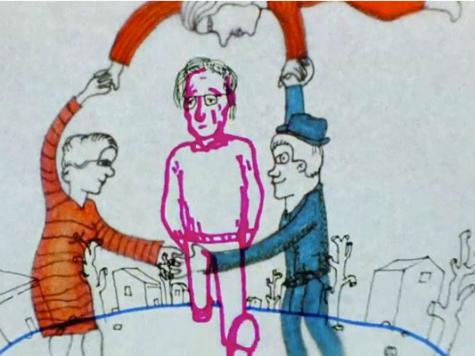
Most film directors, if they had the chance to interview far-left intellectual and linguist Noam Chomsky, would pepper their subject with with political queries.
Not Michel Gondry.
The Eternal Sunshine of the Spotless Mind’director’s new film is a long-ranging chat with the progressive hero that nearly avoids all talk of politics.Gondry wanted audiences to get to know Chomsky rather than debate him courtesy of the documentary Is the Man Who Is Tall Happy?
“By showing his life and the way he talked about his wife and children, that may help his political views come across … let people get closer to him,” Gondry tells Breitbart News.
Gondry eschewed a standard Q&A visual format for Happy, opting to animate the discussion through a series of sketches he spent roughly three years creating.
Happy begins with Gondry defending his approach. He says standard interview documentaries can’t help but influence the information being shared by standard film techniques like cuts and editing. He thought by using animation as a visual accompaniment he could do away with the false notion of impartiality.
“I don’t want to judge other documentaries. Shooting people with a camera is still a great way to convey their spirit and meaning,” he says diplomatically.
The pair discuss language, religion, education, Chomsky’s early years and the painful loss of his wife after a decades-long marriage, all the while Gondry’s doodles march across the screen. Chomsky’s dry voice is unapologetic, but Gondry’s clever drawings invigorate what might otherwise be a university lecture writ large.
Chomsky’s take on organized religion might surprise his ideological detractors. He says religion can serve a positive, unifying purpose in our culture even if he doesn’t believe in life after death.
“He doesn’t challenge people on their beliefs,” Gondry says.
A humorous current in the film is pairing an acclaimed linguist with a French man who struggles with the English language. The two even share a disagreement mid-movie that was partially stoked by Gondry’s inelegant phrasing. That culture clash didn’t stop Gondry from embracing the concept.
“I decided to go ahead and not be shy about being French and not understanding everything,” he says, adding some documentaries are helmed by people who like to show the world “how smart they are.”
Gondry’s directorial career careens from rock documentaries (Dave Chappelle’s Block Party) to surreal romances (The Science of Sleep) to absurdist comedies (Be Kind Rewind). So it’s not surprise to see him tackle an intellectual documentary that avoids a subject so close to Chomsky’s persona.
The director’s work is the antithesis of focus group filmmaking, even if he dabbled in pop culture briefly via his Green Hornet feature. Gondry has no qualms with so-called “popular” movies even after a career spent smashing film formulas to smithereens. He even would sign up for a mainstream studio project again if asked.
“Maybe not for a superhero film,” he quickly adds.

COMMENTS
Please let us know if you're having issues with commenting.